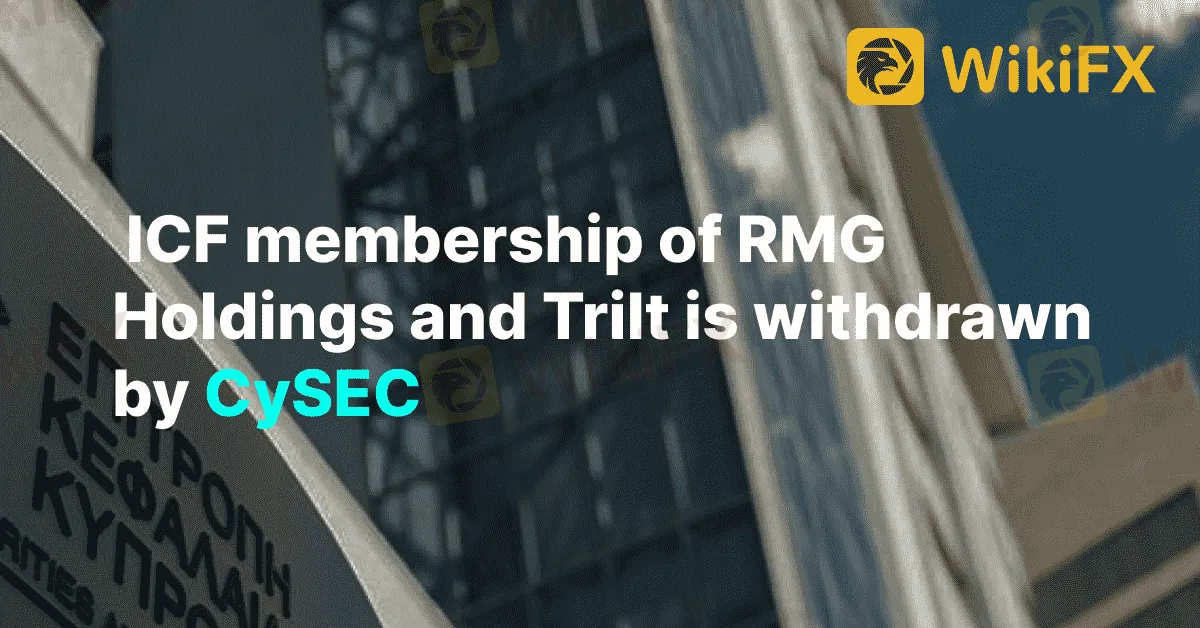简体中文
繁體中文
English
Pусский
日本語
ภาษาไทย
Tiếng Việt
Bahasa Indonesia
Español
हिन्दी
Filippiiniläinen
Français
Deutsch
Português
Türkçe
한국어
العربية
ICF membership of RMG Holdings and Trilt is withdrawn by CySEC
Abstract:The Investors Compensation Fund (ICF) has taken action against two members, RMG Holdings Ltd and Trilt Ltd, according to an announcement today by the Cyprus Securities and Exchange Commission (CySEC).

The Investors Compensation Fund (ICF) has taken action against two members, RMG Holdings Ltd and Trilt Ltd, according to an announcement today by the Cyprus Securities and Exchange Commission (CySEC). The ICF has withdrawn their membership status, following CySEC's decision to revoke their Cyprus Investment Firm (CIF) authorization.
Despite the loss of ICF membership, covered clients are still entitled to receive compensation for any investment operations carried out prior to the withdrawal, as long as they meet the conditions for compensation under the Directive. The revocation of membership status does not prevent covered clients from initiating the compensation procedure.
See the document below:


Disclaimer:
The views in this article only represent the author's personal views, and do not constitute investment advice on this platform. This platform does not guarantee the accuracy, completeness and timeliness of the information in the article, and will not be liable for any loss caused by the use of or reliance on the information in the article.
Read more

The January Effect of 2025 in Forex Markets
Like other financial markets, the forex market is influenced by various factors, including economic data, geopolitical events, and market sentiment. However, one often overlooked factor is seasonality—patterns that recur at specific times of the year. One such seasonal phenomenon is the "January Effect," which can have a notable impact on currency trading.

OPEC's Profound Influence on the Oil Market
At present, oil prices remain relatively stable, but global economic recovery and shifting market demands continue to drive price fluctuations. Amid an uncertain global economic and geopolitical landscape, OPEC’s policies and actions remain key determinants of oil prices.

What Euro Investors Can't Afford to Miss
For euro investors, geopolitical factors, inflation data, and the European Central Bank's policy direction will determine the market trends over the next few months.

How Big is the Impact of the USD-JPY Rate Gap on the Yen?
The U.S. Federal Reserve's repeated rate cuts and the narrowing of the U.S.-Japan interest rate differential are now in sight. So, why is the U.S.-Japan interest rate differential so important for the yen’s safe-haven appeal, especially when global economic uncertainty rises?
WikiFX Broker
Latest News
Think Before You Click: Malaysian Loses RM240,000 to Investment Scam
What Are The Top 5 Cryptocurrency Predictions For 2025?
Lawsuit Filed Against PayPal Over Honey’s Affiliate Fraud
OPEC's Profound Influence on the Oil Market
Just2Trade: SAFE or SCAM?
The January Effect of 2025 in Forex Markets
New York becomes first US city with congestion charge
Currency Calculator






